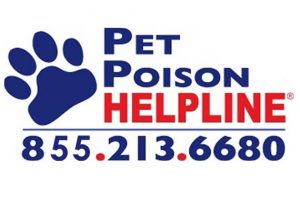Guide to Pet Poisoning!
Did your dog or cat just eat something poisonous? If so, call your primary veterinarian or Pet Poison Helpline immediately. The sooner a dog poisoning or cat poisoning is diagnosed, the easier, less expensive, and safer it is to treat your pet.
What to do if your dog or cat is poisoned:
Immediately remove your pet from the area, and make sure no other pets (or kids!) are exposed to this area. Safely remove any remaining poisonous material from their reach.
Check to make sure your pet is breathing normally and acting fine otherwise.
Collect a sample of the material, along with the packaging, vial, or container, and save it – you will need all that information when you talk to your veterinarian or to a Pet Poison Helpline expert.
Do NOT give your dog any milk, food, salt, oil, or any other home remedies! Also, never inducing vomiting without talking to your veterinarian or Pet Poison Helpline – it may actually be detrimental or contraindicated to induce vomiting!
Don’t give hydrogen peroxide to your pet without checking with a vet or with Pet Poison Helpline first. For you cat lovers, hydrogen peroxide doesn’t work well to induce vomiting (it just causes massive foaming and salivating instead!), and stronger veterinary prescription medications are necessary to get your cat to vomit up the poison Kitty ingested!
Get help. Program your veterinarian phone number, along with an ER vet and Pet Poison Helpline’s phone number (800-213-6680) in your cell phone so you will always have immediate access to help.
Keep in mind that the prognosis is always better when a toxicity is reported immediately, so don’t wait to see if your pet becomes symptomatic before calling for help. It’s always less expensive, and safer for your pet for you to call immediately. Remember that there’s a narrow window of time when we can decontaminate (induce vomiting or pump the stomach) in the case of a poisoning!
Pet Poison Helpline Resources:

